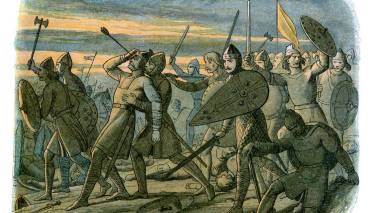
‘I am sorry to say that the generality of women who have excelled in wit have failed in chastity,’ wrote Elizabeth Montagu in 1750, after looking over the memoirs of her contemporary, the witty Mrs Pilkington. Mrs Montagu, learned, respectable and rich, curled her lip at poor Laetitia Pilkington, who started writing for pure pleasure but was then forced to use her pen to keep afloat in a harsh world. She died soon after Mrs Montagu’s comment, and her reputation remained dubious. In the old DNB she was described as an adventuress. But in the 1920s Virginia Woolf devoted a brilliant essay to her, and her memoirs were edited by Iris Barry, who found ‘something heroic and indomitable in her silliness’ and saw that ‘in a queer, outlandish fashion she preserved the honour of womanhood’. The new DNB has made amends, and now Norma Clarke has written her biography. It is very welcome, and she charts her way with admirable clarity through the confusions of a life both bright and painful, and the horrifying early 18th-century world of quarrelling writers, patronage and corruption in which her subject struggled.
She was born in Ireland about 1709 to a mother with aristocratic connections and a father who made a reputation as a fashionable Dublin physician. From childhood Laetitia had a remarkable gift for memorising poetry and she was soon producing her own verses. In her teens she married Matthew Pilkington, a young clergyman with literary ambitions of his own, and they were taken up by Swift, then at the height of his fame. He found them both amusing, and she was clever enough to deal with his form of entertainment in which bullying abuse alternated with praise and petting. She could speak for herself, make the great man laugh, surprise him. This was the best part of her life, during which she bore several children, began to make a reputation as a poet, and was known as one of Swift’s inner circle of friends. She left a vivid account of his conversation and behaviour — rude, rough and generous.
Things went wrong when Swift got an English chaplaincy for Pilkington. He set off eagerly to savour the delights of London, and when she followed him made it clear she was an encumbrance. He was involved with other women, she felt herself entitled to her own freedoms, and once back in Ireland he accused her of adultery, sued for divorce, and got it. Laetitia’s father was dead, she had no protector and her life immediately became chaotic and terrifying. She found herself the prey of any man who chose to attack her and had to defend herself against rape as well as calumny. Her chief defence was her wit, with which she ridiculed the aggressors. Swift did nothing to help her but, alarmed by scandal, simply scratched out her name in his papers.
Hoping to publish her poetry, she returned to London, where she took rooms close to White’s club and became for a while a favourite of its members, entertaining them with her conversation and writing to their commands. It was a precarious business, financially and for her reputation. She was helped by two good men, Colley Cibber, the aged poet laureate, who admired and pitied her, and raised considerable sums for her relief; and by Samuel Richardson, who entertained her and with whom she corresponded. At one point she begged him to spare Clarissa from rape. ‘Consider, if this wounds both Mr Cibber and me (who neither of us set up for immaculate chastity) what must it do with those who possess that inestimable treasure?’ Clarke points out that Richardson supplied Pilkington with paper and encouraged her to write to him — he collected letters from women in order to understand them better — and that she in turn learnt from Richardson’s fiction when she came to write her memoirs.
There was never enough help for her, and the arrival of her son Jack, out of work and dressed in rags, and a daughter she scarcely knew, pregnant and penniless, made things desperate. She was driven from her lodgings and trudged the wintry streets searching for a roof for the birth of her grandchild. Richardson helped again, but Pilkington was exhausted. She had had a spell in the Marshalsea debtors’ prison, and thought of suicide, and in 1747 she decided to crawl back to Ireland. At the end of one of her last letters to Richardson she did not even put her name, saying it was ‘lost, barebit and gnawn, by Slander’s canker tooth’.
Ireland gave her a sort of welcome, and Jack was a good son to her. Lord Kingsborough, a foolish peer, was for a while a generous patron; he was the uncle of the Kingsborough who employed Mary Wollstonecraft as a governess 40 years later — the family’s help to these two women puts some lustre on their otherwise dull name. But even Lord K did not want her to dedicate a volume of her memoirs to him, and when he heard there was talk of her publishing his letters he broke with her. Everyone read the two volumes of her memoirs published in her lifetime, but she died in poverty aged 38, with only Jack at her side.
Her poetry is elegant and readable, but her memoirs shine with energy and wit, and gleaming impressions of character and place, happiness, humiliation and destitution. Woolf described her as a cross between Moll Flanders and Thackeray’s daughter Anne Ritchie, which comes quite close. Norma Clarke has given us a full portrait, unsentimental, just and authoritative. It has long been needed, and she has earned our thanks.




Comments